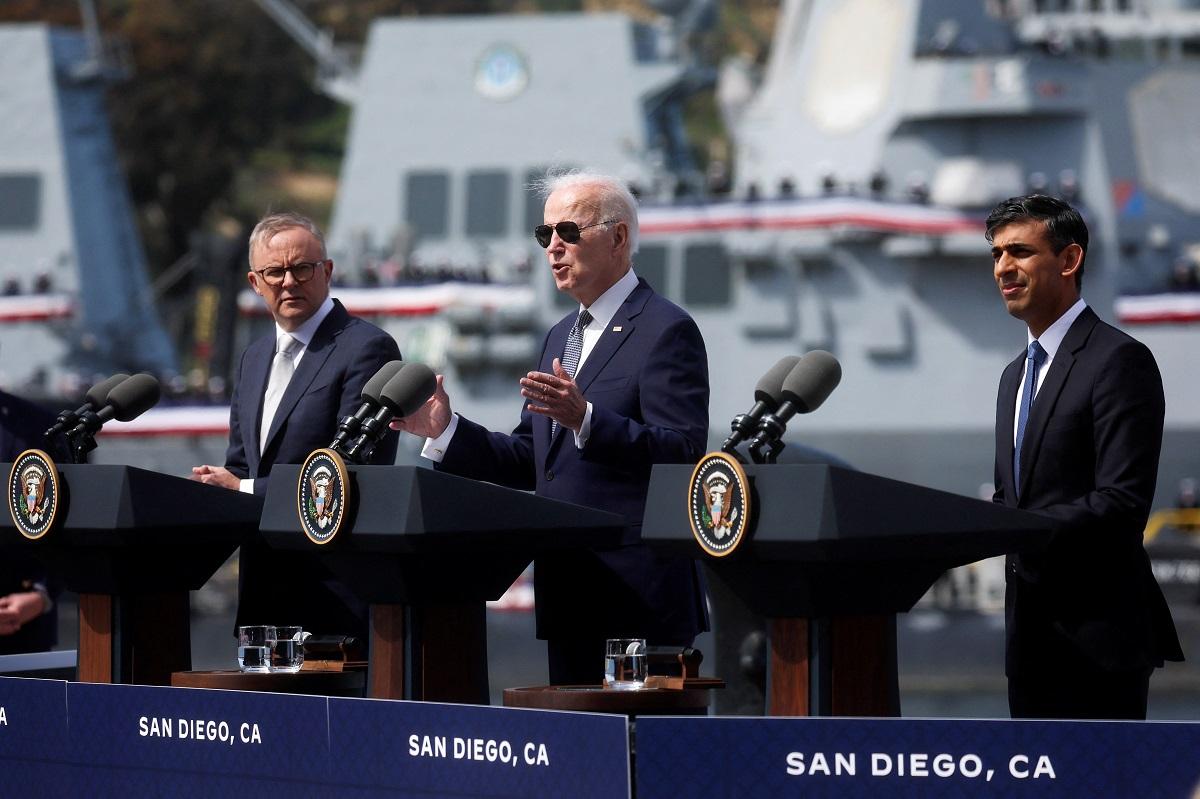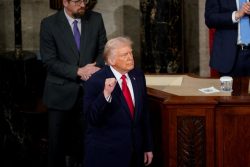
U.S. President Joe Biden, Australian Prime Minister Anthony Albanese and British Prime Minister Rishi Sunak deliver remarks on the Australia – United Kingdom – U.S. (AUKUS) partnership, after a trilateral meeting, at Naval Base Point Loma in San Diego, California U.S. March 13, 2023.
10:15 JST, March 14, 2023
SAN DIEGO (Reuters) – The United States, Australia and Britain on Monday unveiled details of a plan to provide Australia with nuclear-powered attack submarines from the early 2030s to counter China’s ambitions in the Indo-Pacific.
Addressing a ceremony at the U.S. naval base in San Diego, accompanied by Australian Prime Minister Anthony Albanese and British Prime Minister Rishi Sunak, U.S. President Joe Biden called the agreement under the 2021 AUKUS partnership part of a shared commitment to a free-and-open Indo-Pacific region with two of America’s “most stalwart and capable allies.”
Sunak called it “a powerful partnership,” adding: “For the first time ever it will mean three fleets of submarines working together across the Atlantic and Pacific keeping our oceans free … for decades to come.”
Under the deal, the United States intends to sell Australia three U.S. Virginia class nuclear-powered submarines, which are built by General Dynamics, in the early 2030s, with an option for Australia to buy two more if needed, a joint statement said.
It said the multi-stage project would culminate with British and Australian production and operation of a new submarine class – SSN-AUKUS – a “trilaterally developed” vessel based on Britain’s next-generation design that would be built in Britain and Australia and include “cutting edge” U.S. technologies.
Britain would take delivery of its first SSN-AUKUS submarine in the late 2030s, and Australia would receive its first in the early 2040s. The vessels will be built by BAE Systems and Rolls-Royce.
“The AUKUS agreement we confirm here in San Diego represents the biggest single investment in Australia’s defense capability in our history, strengthening Australia’s national security and stability in our region,” Albanese said at the ceremony.
An Australian defense official said the project would cost A$368 billion ($245 billion) by 2055.
AUKUS will be the first time Washington has shared nuclear-propulsion technology since it did so with Britain in the 1950s.
Biden stressed that the submarines would be nuclear-powered, not nuclear armed: “These boats will not have nuclear weapons of any kind on them,” he said.
China has condemned AUKUS as an illegal act of nuclear proliferation. In launching the partnership, Australia also upset France by abruptly canceling a deal to buy French conventional submarines.
Asked if he was worried China would see the AUKUS submarine deal as aggression, Biden replied “no.” He said he expected to speak to Chinese leader Xi Jinping soon, but would not say when.
U.S. national security adviser Jake Sullivan pointed on Friday to Beijing’s own military buildup, including nuclear-powered submarines, saying: “We have communicated with them about AUKUS and sought more information from them about their intentions.”
Australia offered China a briefing on the submarine deal but was not aware of any response from Beijing, Australian Defence Minister Richard Marles said.
The agreement will see U.S. and British submarines deployed in Western Australia as soon as 2027 to help train Australian crews and bolster deterrence. U.S. officials said this would involve four U.S. submarines and one British in a few years.
This first phase of the plan is already underway with the U.S. Virginia-class nuclear-powered attack submarine Asheville visiting Perth in Western Australia, officials said.
BIG QUESTIONS AND HUGE INVESTMENT
A senior U.S. official said AUKUS reflected mounting Indo-Pacific threats, not just from China towards self-ruled Taiwan and in the contested South China Sea, but also from Russia, which has conducted joint exercises with China, and North Korea as well.
Big questions remain about AUKUS, not least over strict U.S. curbs on the extensive technology sharing needed for the project and about how long it will take to deliver the submarines, even as the perceived threat posed by China mounts.
In a reflection of stretched U.S. production capacity, a second senior U.S. official told Reuters it was “very likely” one or two of the Virginia-class submarines sold to Australia would be vessels that had been in U.S. service, something that would require congressional approval.
Analysts said that given China’s growing power and threats to reunify with Taiwan by force if necessary, it was vital to advance the second stage of AUKUS, which involves hypersonics and other weaponry that can be deployed more quickly.
British and Australian officials said this month work was still needed to break down bureaucratic barriers to technology sharing and Monday’s announcement did not cover this second stage.
The second U.S. official said Australia would contribute to boosting U.S. and British submarine production and maintenance capacity.
He said Washington was looking at “double digit billion” investment in its submarine industrial base on top of $4.6 billion already committed for 2023-29 and that the Australian contribution would be less than 15 percent of the total.
Albanese said he expected AUKUS would result in A$6 billion invested in Australia’s industrial capability over the next four years and create around 20,000 direct jobs over the next 30. He said it would require funding amounting to around 0.15% of GDP per year.
Britain, which left the European Union in 2020, says AUKUS will help boost its economy’s low growth rate. Sunak said AUKUS was “binding ties to our closest allies and delivering security, new technology and economic advantage at home.”
Top Articles in News Services
-

Survey Shows False Election Info Perceived as True
-

Hong Kong Ex-Publisher Jimmy Lai’s Sentence Raises International Outcry as China Defends It
-

Japan’s Nikkei Stock Average Touches 58,000 as Yen, Jgbs Rally on Election Fallout (UPDATE 1)
-

Japan’s Nikkei Stock Average Falls as US-Iran Tensions Unsettle Investors (UPDATE 1)
-

Trump Names Former Federal Reserve Governor Warsh as the Next Fed Chair, Replacing Powell
JN ACCESS RANKING
-

Producer Behind Pop Group XG Arrested for Cocaine Possession
-

Japan PM Takaichi’s Cabinet Resigns en Masse
-

Man Infected with Measles Reportedly Dined at Restaurant in Tokyo Station
-

Israeli Ambassador to Japan Speaks about Japan’s Role in the Reconstruction of Gaza
-

Videos Plagiarized, Reposted with False Subtitles Claiming ‘Ryukyu Belongs to China’; Anti-China False Information Also Posted in Japan
























